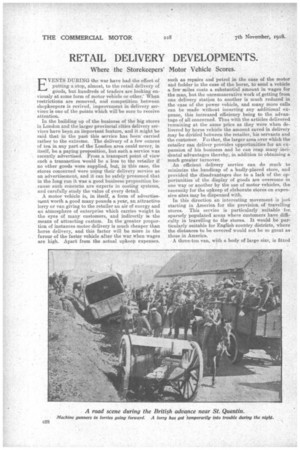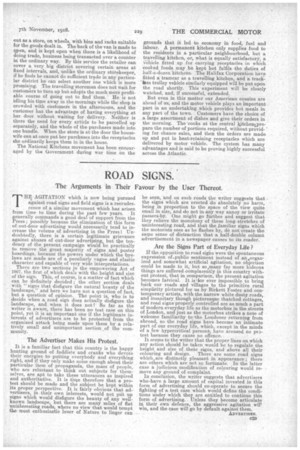RETAIL DELIVERY DEVELOPMENTS.
Page 8

Page 9

If you've noticed an error in this article please click here to report it so we can fix it.
Where the Storekeepers' Motor Vehicle Scores.
EVENTS DURING the war have had the effect of putting a stop, almost, to the retail delivery of goods, but hundreds of traders are looking en-. viously at some form of motor vehicle or other: When restrictions are removed, and competition between shopkeepers is revived, improvement in delivery services is one of the points which will be sure to receive attention.
In the building up of the business of the big stores in London and the larger provincial cities delivery services have been an iinportant feature, and it might be said, that in the past this service has been carried rather to the extreme. The delivery of a few ounces of tea in any part of the London area could never, in itself, be a paying proposition, but such a service was recently advertised. From a transport point of view such a transaction would be a loss to the retailer if no other goods were supplied, bill, in this case, the stores concerned were using their delivery service as an advertisement, and it can be safely presumed that in the long run it was a good business proposition because such concerns are experts in costing systems, and carefully study the value of every detail.
A motor vehicle is, in itself, a form of advertisement worth a good many pounds a year, an attractive lorry or van giving to the retailer an air of energy and an atmosphere of enterprise which carries weight in the eyes of many customers, and indirectly is the means of attracting custom. In the greater proportion of instances motor -delivery is much cheaper than horse delivery, and this factor will be more in the fa.your of the faster vehicle after the war when wages. are high. Apart from the actual upkeep expenses. such as repairs and petrol in the ease of the motor and fodder in the case of the horse, to send a vehicle a few miles costs a substantial amount in wages for the man, but the unremunerative work of getting from one delivery station to another is much reduced in the case of -the power. vehicle, and many more calls can be made without incurring any additional expense this increased efficiency being to the advantage Of all concerned. Thus with the articles delivered remaining at the same price as they were when delivered by horse vehicle the amount saved in delivery may be divided between the retailer, his servants and the customer. Further, the Larger area over which the retailer can deliver provides opportunities for an expansion of his business and he can reap many incidental advantages thereby, in addition to obtaining a much greater turnover. An efficient delivery service can do much to ' minimize the handicap of a badly-placed store, and provided the disadvantages due to a lack of the opportunities of the display of goods are overcome in one way or another by the use of motor vehicles, the necessity for the upkeep of elaborate stores on expensive sites may be dispensed with.
In this direction an interesting movement is just starting in America. for the provision_ of travelling stores. This service is particularly suitable for. sparsely populated areas where customers have difficulty in travelling to the stores. It would be par-. ticularly suitable for English country districts, where the distances to be covered would not be so great asthose in America.
A three-ton van, with a body of large size, is fitted out as a store, on wheels, with bins and racks suitable for the goods dealt in. The back of the van is made to open, and is kept open when there is a likelihood of doing trade, business being transacted over a counter in the ordinary way. By this service the retailer can cover a very big district covering certain areas at fixed intervals, and, unlike the ordinary storekeeper, if he finds he cannot do sufficient trade in any particular district he can select another one which is more promising. The travelling storeman does not wait for customers to turn up but adopts the much more profitable course of going out to find them. He is not idling his time away in the mornings while the shop is crowded with customers in the afternoons, and the customer has the advantage of having everything at her door without waiting for delivery. Neither is there the need for every article to be parcelled up separately, and the whole of the purchases made into one bundle. When the store is at the door the housewife can at once put her purchases into the receptacles she ordinarily keeps them in in the house.
The National Kitchens movement has been enceuraged by the Government during war time on the grounds that it led to economy in food, fuel and labour. A permanent kitchen only supplies food to the residents in a particular neighbourhood, but a travelling kitchen, or, what is equally satisfactory, a ITahicle fitted up for carrying receptacles in which cooked foods may be kept hot fulfils the duties of half-a-dozen kitchens. The Halifax Corporation have fitted a tramcar as a travelling kitchen, and a tra,ckless trolley vehicle similarly equipped will be put upon the road shortly. This experiment will be closely watched, and, if successful, extended.
But even in this matter our American cousins are ahead of us, and the motor vehicle plays an important part in an undertaking which provides hot meals in any part of the town. Customers have the choice of a large assortment of dishes and give their orders in the morning. The 'cooks at the central laitcheikprepare the number of portions required, without providing for chance sales, and then the orders are made up and put in heat-retaining receptacles which are delivered by motor vehicle. The system has many advantages and is said to be proving highly successful across the Atlantic.






















